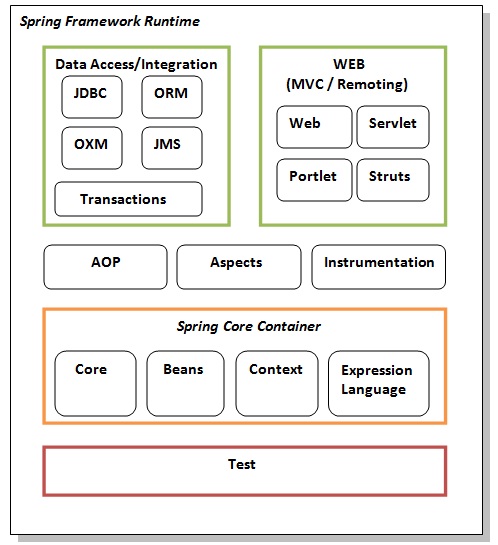The Spring Framework consists of various modules that provide different functionalities and features to cater to the diverse needs of enterprise application development. As of my last knowledge update in September 2021, here are some of the core Spring modules:
Spring Core Container:
This forms the foundation of the Spring Framework and includes the core features like dependency injection and the IoC (Inversion of Control) container. Key modules within this category include:- Spring Beans: Provides support for defining and managing beans (components) in the Spring container.
- Spring Core: Provides the fundamental features of the Spring Framework, including the IoC container and events.
Spring AOP (Aspect-Oriented Programming):
This module supports Aspect-Oriented Programming, allowing you to define aspects and apply them to your application’s objects. Key modules within this category include:- Spring AOP: Provides support for aspect-oriented programming in Spring.
Spring Data Access/Integration:
These modules help with data access and integration with other technologies and data sources.- Spring JDBC: Simplifies JDBC (Java Database Connectivity) code and error handling.
- Spring ORM (Object-Relational Mapping): Provides integration with various ORM frameworks like Hibernate, JPA, and JDO.
- Spring JMS (Java Messaging Service): Simplifies working with messaging systems.
- Spring Messaging: Provides support for building messaging applications.
- Spring Transactions: Offers support for programmatic and declarative transaction management.
-
Spring Web:
These modules facilitate web application development.- Spring Web: Provides basic web application features like multipart file upload, initialization, and others.
- Spring Web MVC: Implements the Model-View-Controller (MVC) pattern for building web applications. .
- Spring Web Websocket: Supports WebSocket-based communication in web applications.
-
Spring Security:
This module provides comprehensive security features for Spring-based applications. It allows for easy implementation of authentication, authorization, and other security-related concerns.
-
Spring Test:
Helps with testing Spring components and applications, including support for unit and integration testing.
- The Spring framework comprises of many modules such as core, beans, context, expression language, AOP, Aspects, Instrumentation, JDBC, ORM, OXM, JMS, Transaction, Web, Servlet, Struts etc. These modules are grouped into Test, Core Container, AOP, Aspects, Instrumentation, Data Access / Integration, Web (MVC / Remoting) as displayed in the following diagram.

Please note that the Spring Framework is continually evolving, and new modules or changes to existing modules may have occurred since my last update in September 2021. To get the most up-to-date information on Spring modules and their features, it’s recommended to visit the official Spring Framework documentation or the Spring community website.


